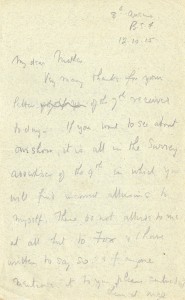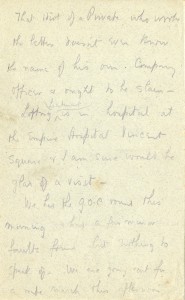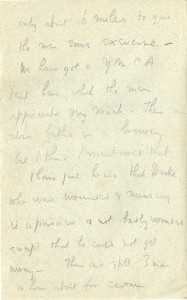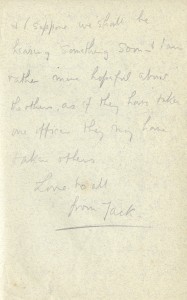Transcription
8th Queens
B. E. F.
12. 10. 15.
My dear Mother,
Very many thanks for your letter [illegible] of the 7th received to-day. If you want to see about our show, it is all in the Surrey Advertiser of the 9th in which you will find incorrect allusions to myself. These do not allude to me at all but to Fox & I have written to say so & if anyone mentions it to you please contradict them at once. That idiot of a Private who wrote the letter doesn’t even know the name of his own Company Officer & ought to be slain.
Lofting (Lieutenant) is in hospital at the Empire Hospital Vincent Square & I am sure would be glad of a visit.
We had the G. O. C. round this morning & had a few minor faults found but nothing to speak of. We are going out for a route march this afternoon only about 6 miles to give the men some exercise.
We have got a Y. M. C. A. tent here, which the men appreciate very much. there are also baths in a brewery but I think I mentioned that.
I have just heard that Duke, who was wounded & missing is a prisoner & not badly wounded except that he could not get away. There are still 3 more to hear about for certain & I suppose we shall be hearing something soon & I am rather more hopeful about the others, as if they have taken one officer they may have taken others.
Love to all
from Jack.
Commentary
In this letter, Peirs is still in command of his battalion, which has been out of the line for a few days. They day before writing this (the 11th) they were inspected by General Capper, and all things considered, Peirs was pleased with their performance. You will note that in the last two weeks, since their fight at Loos, the battalion received much attention from their brigade and division commanders, including the issuing of official praise for their conduct. Their generals certainly were not chateau commanders, but instead were more hands on and knew the importance to morale of keeping in touch with their men.
Peirs expresses annoyance in this letter that one of the privates in his battalion wrote home to a local newspaper of their action at Loos and got Peirs confused with another officer. He instructs his mother to give credit where it is due – the heroic action the private witnessed were by B Company commander, Captain Fox. Fox had been transferred over to command the West Kents, but would shortly return to company command.
You will also note that Peirs’s mother has inquired about the battalion’s comfort and that he writes home about a Y.M.C.A. support tent as well a local baths, which were set up in the vats of an old brewery. His mother has been looking in on wounded officers and their families, part of what she understands as her role in support of the war.
This brings up an interesting point about war-time conceptions of duty. Peirs’s duty was as an army officer: he had official as well as unofficial roles within the battalion that were understood within military culture. Yet, both his father and mother felt a keen sense of duty not only to provide for their son at the front, but also, to look after the well-being of his officers and men. His father inquires about recreation – harmonicas and footballs for the men – his mother about visiting or writing to the families of the wounded. Duty was not a word we should understand in a strictly military context, but was a social concept, defined by one’s class and role, that was understood on both sides of the channel during the war.




